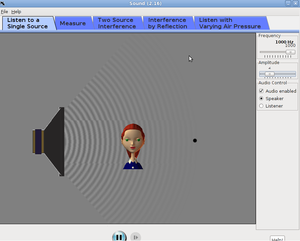Difference between revisions of "Sound propagation of sound activity 1"
Jump to navigation
Jump to search
| (2 intermediate revisions by one other user not shown) | |||
| Line 13: | Line 13: | ||
==Website interactives/ links/ simulations== | ==Website interactives/ links/ simulations== | ||
| − | + | [[Image:phet5.png|300px|link=http://phet.colorado.edu/en/simulation/sound]] | |
| + | |||
==Process (How to do the activity)== | ==Process (How to do the activity)== | ||
| − | Observe the simulation “Listen to a single source”. | + | Observe the simulation “Listen to a single source”. |
| + | |||
==Developmental Questions (What discussion questions)== | ==Developmental Questions (What discussion questions)== | ||
# Enable the audio-enabled and check the difference between the speaker and the listener. Why is this so? | # Enable the audio-enabled and check the difference between the speaker and the listener. Why is this so? | ||
| Line 22: | Line 24: | ||
==Evaluation (Questions for assessment of the child)== | ==Evaluation (Questions for assessment of the child)== | ||
| − | {{#widget:YouTube|id=d9A2oq1N38}} | + | {{#widget:YouTube|id=-d9A2oq1N38}} |
==Question Corner== | ==Question Corner== | ||
[http://karnatakaeducation.org.in/KOER/en/index.php/Sound Back] | [http://karnatakaeducation.org.in/KOER/en/index.php/Sound Back] | ||
Latest revision as of 05:05, 25 July 2014
Activity No # 1 - Sound source using PhET
Estimated Time
50 minutes
Materials/ Resources needed
Laptop, projector
Prerequisites/Instructions, if any
- Production of sound using different objects
- Use of tuning fork to produce sound
- Introduction to material waves
Multimedia resources
Website interactives/ links/ simulations
Process (How to do the activity)
Observe the simulation “Listen to a single source”.
Developmental Questions (What discussion questions)
- Enable the audio-enabled and check the difference between the speaker and the listener. Why is this so?
- When you increase the frequency – what are the changes you see, hear? Do you come across these kinds of sounds (frequencies) anywhere. When you change the frequency, the nature of sound changes. There is a name for it. Ask your teacher. Where else does this aspect of sound come in?
- When you change the amplitude, what happens? Based on what you hear, describe what you think is the meaning of amplitude.
Evaluation (Questions for assessment of the child)
